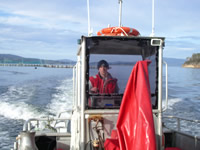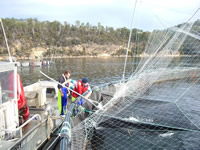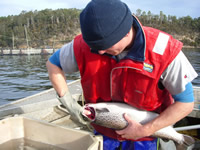|
Where did you grow up?
I was born in Ulverstone and lived there until 17, when further study prompted me to leave home. My mother raised me in a single parent family with two other brothers. Schooling was local for both primary (East Ulverstone) and secondary (Ulverstone High) before travelling to Devonport to complete years 11 and 12 at The Don College. My spare was split between sport (mostly soccer) and trout fishing, a passion passed on from my grandfather. The interest in fishing was half trying to find and lure the fish, and half wanting to find out what was around the next bend in the river. The later interest led to extensive exploration of the Leven River and its surrounding tributaries even when the trout season was closed.
What inspired you to do science?
At high school I excelled in mathe, but my interest in this decreased at college as I discovered biology and chemistry (although I still did an accounting class, mostly to confirm it was not the career for me!). At college I was also fortunately exposed to both the Tasmanian fisheries cultivating and restocking program and the outlawing of fishing for giant freshwater crayfish (Astocopsis gouldi). This exposure and long held interest in trout fishing and the surrounding waterways gave me the desire to seek employment with Tasmanian Inland Fisheries. Later I enrolled in the University of Tasmania's Aquaculture program in Launceston, and it was move that I've not regretted since.

What did you study at uni?
In 2001 I completed a Bachelor of Aquaculture degree and in 2002 I completed an Honours project, documenting the development of the digestive system in juvenile blacklip abalone. While at university I moved out of my Ulverstone home into share housing, studied for my degree with people from all over Australia and carried out my Honours research sharing a lab with researchers from around the world. When graduating I was given a piece of rolled wax paper tied with a ribbon. When seeking employment I had an expanded view of what a career in science could offer and a desire to use it as a ticket to explore the world. It's a desire that still drives me today.
Where do you work now?
After Honours I discovered my calling in aquaculture was in private industry. I'm now employed as a Fish Health Manager by the Huon Aquaculture Company, the fastest expanding and leading privately owned Atlantic salmon producer in Australia. My position requires routine monitoring of amoebic gill disease in eight marine farming leases throughout the Huon River and D'Encetastreaux Channel. Sampling and identification of acute disease outbreaks, assistance to researchers, algal monitoring, brood stock selection and smolt (juvenile Atlantic salmon) transport are also my responsibility.
 
What do you love about science?
My career in aquaculture provides constant mental stimulation in a physical and healthy work environment, in the most picturesque surrounds in Tasmania. I have the opportunity to stay in touch with leading industry research and in contact with internationally renowned people within the salmon industry. Aquaculture is a world- wide established industry providing employment opportunity overseas, not that I necessarily wish to leave Australia, but it is comforting to have options. When I wake up in the morning I still want to go to work.
|
